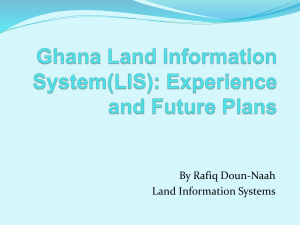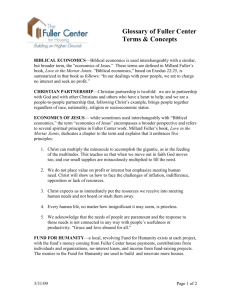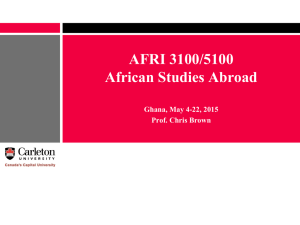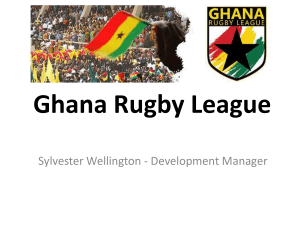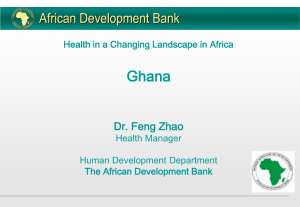PROJECT PROPOSAL-SHELTER AND WATER
advertisement
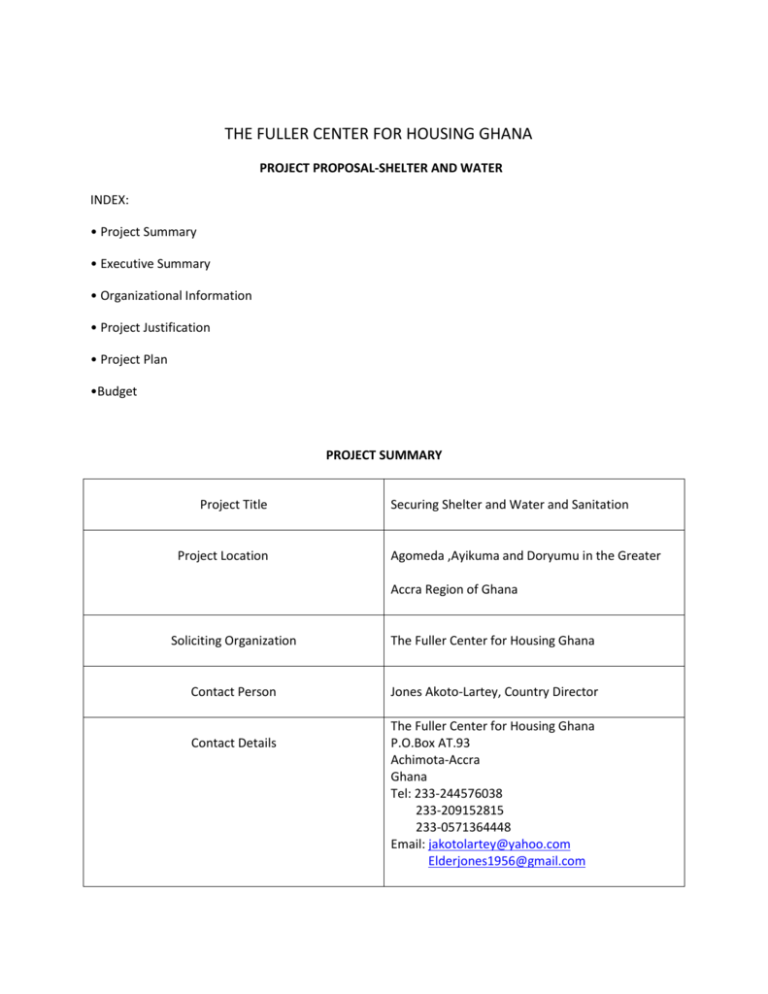
THE FULLER CENTER FOR HOUSING GHANA PROJECT PROPOSAL-SHELTER AND WATER INDEX: • Project Summary • Executive Summary • Organizational Information • Project Justification • Project Plan •Budget PROJECT SUMMARY Project Title Project Location Securing Shelter and Water and Sanitation Agomeda ,Ayikuma and Doryumu in the Greater Accra Region of Ghana Soliciting Organization The Fuller Center for Housing Ghana Contact Person Jones Akoto-Lartey, Country Director Contact Details The Fuller Center for Housing Ghana P.O.Box AT.93 Achimota-Accra Ghana Tel: 233-244576038 233-209152815 233-0571364448 Email: jakotolartey@yahoo.com Elderjones1956@gmail.com Executing Organization Project Cost 1. Shelter 2. Borehole Duration of Project The Fuller Center for Housing Ghana One house cost $,6000 Cost of sinking one borehole and accessories cost$3000 Open EXECUTIVE SUMMARY: The Greater Accra Region of Ghana is a largely cosmopolitan and commercial province with a population of 3 million people. Though it is commercial most people live in poverty. There is compelling need for accommodation resulting in property owners charging huge sums of monies as rent advance ranging from two to ten years .A greater number who cannot afford the rent live in slums, sub-standard and overcrowded houses which lack sanitary conditions. Overcrowding is a common feature in many households and this poses a health hazard. This issue of poverty housing is accompanied by lack of potable water for both domestic and commercial use. It is in line with this that The Fuller Center for Housing is assisting families in need to construct decent and affordable houses at Agomeda, Ayikuma, and Doryumu in the Dangme West District of the Greater Accra Region, which fall within a radius of 40 kilometers from Accra, the national capital. Through this program, The Fuller Center for Housing plans to empower families in the low income levels to respond to their immediate needs for shelter and clean water while building local leadership and stimulating economic activities and livelihoods. This program which started three years ago will continue to run through the years as long land is available. ▪ Poverty Housing: Will build as many decent, affordable houses with sanitation facilities and manage a revolving fund to support continued building for more beneficiaries. ▪ Access to Water: Will establish water infrastructure through digging of boreholes (through partnership with water providers) and training in water facility management for water committees in our operational communities. It is an accepted fact that lack of safe drinking water and sanitation facilitates the root causes of hunger, disease and poverty. ORGANIZATIONAL INORMATION: The Fuller Center for Housing Ghana is a covenant partner of The Fuller Center for Housing Inc. It is a Christian not for profit housing ministry dedicated to eliminating poverty housing worldwide. It was founded in Spring, 2005 at Americus, Georgia in the United States of America by Millard and Linda Fuller, the founders of Habitat for Humanity. The Fuller Center is legally registered in Ghana and developing a new community at Agomeda near Dodowa in the Dangme West District of the greater Accra Region of Ghana to alleviate poverty and substandard housing. Each Fuller Center House which comprise of a living room, 2 bedrooms, kitchen, toilet and bath is cost $6,000.00. The Fuller Center provides durable building materials while all selected homeowners participate in sweat equity activities (labor) for the construction of their own houses and that of others. PROJECT JUSTIFICATION: ▪Shelter: The demand for safe and affordable housing is enormous and the United Nations estimates that over one billion people around the world live in sub-standard housing of which Ghana is no exception. Housing in Ghana is characterized by insufficient stocks, inadequate housing delivery frameworks, limited financial provisions and ongoing undersupply (Homeless International, 2004). Most families in our operational communities live in run- down buildings. These have leaking roofs and broken or cracked walls which are incapable of keeping out the water from diving rains that can deluge the area in the rainy season. Consequently, there are many instances where deteriorating houses have collapsed during rainstorm killing or injuring its occupants. ▪Water: Ghana which has a population of 24million people is faced with water and sanitation problems. Half of the population is not able to access safe water The rural areas rely on unprotected wells, springs, rivers, lakes and ponds which result in water-borne diseases including guinea worm, bilharzia, buruli ulcer and diarrhea. The other side of the fact is that most of these water sources dry up during the dry season and families have to travel long distances to look for water. Though there is a government policy to bring water systems to all rural communities but the demand far exceeds the ability of the government to respond to all the requests. Implementation is slow in some areas and non-existent in others. This project initiative will help to solve multiple problems - limited access to healthy and affordable housing and lack of potable water to empower low income families. PROJECT PLAN: Project Objectives: 1. Address the problem of sub-standard housing by constructing houses to shelter many families in need. 2. Employ local masons and carpenters in the project location, thereby helping resources stay in the community and promote economic activity 3. Maintain a revolving fund for construction of more houses to serve needy families 4. Establish boreholes to serve as sources of potable water for our operational communities and train local water committees members to manage the facilities. This will be done in partnership with other NGO’S in water and sanitation. PROJECT IMPACT: This project will have the following impacts: 1. Decent and affordable housing for Agomeda, Ayikuma and Doryumu communities: •Many people will have decent homes to stay away from the overcrowding in the national capital and can commute to work daily 2. Family Health will improve: •Incidence of water-borne diseases (guinea worm, diarrhea, bilharzias, and buruli ulcer etc.) will decrease by providing improved access to safe and potable water for over 15,000 people and providing hygiene education by our partners. •Increase access to safe and potable water. Many people in the communities will have potable water. •Women and children will spend less travel hours in search of water and therefore reserve more time and energy for other activities. METHODOLOGY: The Fuller Center Ghana seeks to build more than houses. We believe that community should be holistic. This implies that our goals go beyond the counting of houses built. In addition to the mission of providing shelter for the needy families, we will try to focus on other areas such as water and sanitation, livelihood and leadership in partnership with others. MONITORING AND EQALUATION PROCESS: ▪ Monitoring; Monitoring of the project would be executed in the following manner - monthly progress reports would be submitted to the international office/funding agency or donor which would among others cover 1. The application of funds 2. Status of houses construction 3. Status on all other project activities • Evaluation: Evaluation exercises will be participatory and will involve key stakeholders. BUDGET: CATEGORY Constructing of one affordable house Cost of digging one borehole and accessories BUDGET IN US DOLLARS 6000.00 3000.00 NOTE: Donors can fund the construction of many houses as they can and a number of boreholes.



